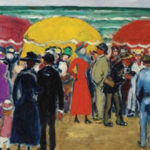We run our website the way we wished the whole internet worked: we provide high quality original content with no ads. We are funded solely by your direct support. Please consider supporting this project.
Should churches have armed security guards?
Question: Recently (December, 2007) a security guard at New Life Church in Colorado Springs shot and apparently killed a man who was shooting people in the church parking lot. The pastor (Brady Boyd) hailed her as a “real hero.” Do you think churches should have armed security guards and do you think the pastor was right in calling this woman a “hero”?
Answer: By all normal standards, this woman was justified in shooting the threatening man and should be regarded as a “hero” for her bravery. But the Kingdom of God is not normal. The Kingdom always looks like Jesus. When Jesus was threatened, Peter tried to defend him with violence. It was, by all normal standards, a justified use of force in self-defense and Peter should be regarded as heroically brave for using it. (He was, after all, taking on a mob!) Yet Jesus rebuked Peter for his action.
Later, Jesus told Pilate his Kingdom was “not of this world,” and he appealed to the fact that his followers were not fighting in his defense as proof of his claim (Jn 18:36). This is consistent with everything else Jesus taught his disciples. We are never to respond to violence with violence (Mt 5:39) but are rather to love and do good to our enemies (e.g. Lk 6:27-35, cf. Rom. 12:17-21).
The way followers of Jesus show that they belong to a Kingdom that is “not of this world” is by refusing to act according to the common sense of the world and by refusing to fight when it seems justified to do so. The central call of the Kingdom is to follow Jesus’ example in all things, especially in our willingness to suffer instead of using violence in self-defense (e.g. I Cor 4:6; 11:1; Eph 5:1-2; Phil. 3:17; I Thess 1:6; 2 Thess 3:7; Col 2:6; I Pet 2:21). So, while I can grant that this security guard was brave and even “heroic” by ordinary standards, I cannot grant that she was a hero in a Kingdom sense of the term. The criteria for heroism in the Kingdom is not how brave one is in using violence, but how brave one is in imitating Jesus’ refusal to use violence.
Along the same lines, I can understand why churches — especially mega-churches — have security guards. From my own experience I can testify that public figures sometimes get death threats. But as practically expedient as this is, I think it is antithetical to the Kingdom. Because by doing this, we’re saying we have no intention of following Jesus’ teaching and example if and when we’re threatened.
I know this may strike some — maybe most — as insane, and I actually respect people who, out of integrity, reject Jesus’ teaching as insane. But for people who have pledged their life to following Jesus, we have no choice but to follow his example, even if it strikes us as insane. For if Jesus’ teaching strikes us as insane, it is only because our criteria of sanity is set by a fallen world that instinctively relies on violence to solve problems.
Category: Q&A
Tags: Christian Life, Church, Peacemaking, Q&A, Social Issues, Violence
Topics: Enemy-Loving Non-Violence, Ethical, Cultural and Political Issues
Related Reading

How do you respond to Ephesians 1:4-5?
Question: Ephesians 1 refers to believers as predestined before the foundation of the world. How do you reconcile this with your view that free actions of people (like choosing to believe in Christ) can’t be predestined or even foreknown ahead of time? Answer: It took three hundred years before anyone in Church history interpreted the…

The REAL Problem with Divine Violence in the OT
As I mentioned in my previous blog, while I will continue to offer video-blogs responding to questions that come in, I’m also planning on sprinkling in reflections based on my forthcoming book, Crucifixion of the Warrior God, over the next couple months. Today, I just want to state what I consider to be the real…

How do you respond to Daniel 2:31–45?
Daniel interprets Nebuchadnezzar’s dream to the effect that he possesses a kingdom of “gold” (vs. 38). After this there shall arise “another kingdom inferior to yours, and yet a third kingdom of bronze which shall rule over the whole earth. And there shall be a fourth kingdom, strong as iron…it shall crush and shatter all…

What is the significance of 2 Kings 13:3–5?
The Lord judged the Israelites by allowing them to be oppressed by King Hazael of Aram (vs. 3). “But Jehoahaz entreated the Lord, and the Lord heeded him; for he saw the oppression of Israel, how the king of Aram oppressed them. Therefore the Lord gave Israel a savior, so that they escaped from the…

Making Room for Doubt and Questions in Our Youth Curriculum
This article from a Christianity Today blog was sent to us from a reader (Thanks Laura!) reflecting on the need for making space for doubt and questions in our youth curriculum. From the article: In our Sticky Faith research, geared to help young people develop a Christian faith that lasts, a common narrative emerged: When young people asked…

Doesn’t the open view demean God’s sovereignty?
The Open view demeans God’s sovereignty only if one assumes that “sovereignty” means “meticulous control.” By why think this is the way God wants to rule the world? The biblical narrative presents a God who gives humans (and apparently angels) free will, who is flexible and creative in running the world, and who relies at…
